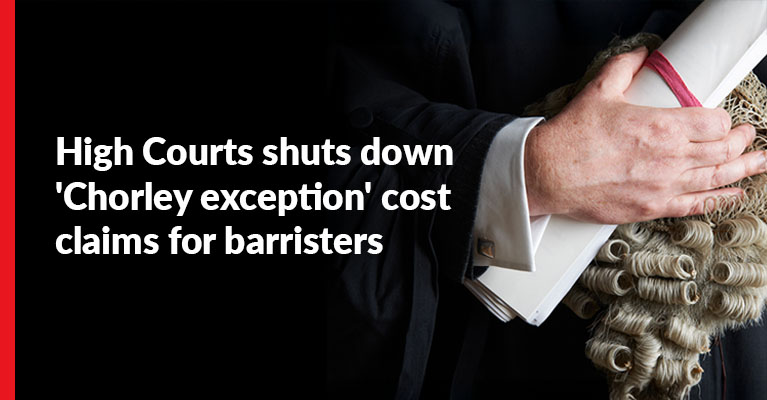Insights

High Court shuts down ‘Chorley exception’ cost claims for barristers
In a major decision delivered on 4 September 2019, Bell Lawyers Pty Ltd v Pentelow [2019] HCA 29 , the High Court has ended the right of lawyers to claim costs when they are self-represented litigants, saying the special rule was "an anomaly and an affront to the fundamental value of equality of all persons before the law". Over 10 years ago, Sydney barrister Janet Pentelow was briefed on a family law case by Bell Lawyers...

Keeping the Knowledge: Understanding the Value of your Data and how to Protect it.
Data is now the most valuable commodity in the world. Still, few businesses outside the tech sphere have fully come to terms with the value of the data they hold - and the legal industry is no different. Knowledge Managers undertake a number of data-intensive activities - managing large numbers of documents, precedents and firms’ proprietary data, intranets and other sources of digital information crucial to smooth...

5 Technologies Driving Disruption in Legal
Not since the days of King Hammurabi has the legal industry faced the magnitude of change it is facing today. Hammurabi was the first to actually codify and inscribe Babylonian law into stone, around 1760 BC. So the start of the legal industry – and a solicitor’s favourite term: “Written in stone” – can be traced back millennia. The legal field has been largely untouched by the growing march of technology – stone gave...

Don’t cry over spilt … liquid, unless it’s a casual act of negligence
The term “casual act of negligence” is often used to describe the alleged liability that flows after a slip and fall even after a cleaner inspects an area. Recent Court of Appeal decisions have provided some guidance on how the court examines such allegations, providing occupiers and cleaners of commercial premises with some certainty when dealing with similar cases. Cleaning mishap cases have been well-reported. Significantly...

Lawyer vs AI: A legal revolution
If futurists and experts are to be believed, the impact of artificial intelligence (AI) on humankind will be as significant as the Industrial Revolution. A recent study by the McKinsey Global Institute reports that automation and other new technology could eliminate as many as 800 million jobs by 2030. Yet leaders in the sector, such as Elon Musk and Google’s chief engineer Ray Kurzweil, believe the coming automation...

Mandatory Data Breach Notification - Tips and Traps
This article is an extract from Mandatory Data Breach Notification – Tips and Traps. Download the full Mandatory Data Breach Notification whitepaper today. Do you expect to advise corporate clients in the face of changing legislation this year? Are you already advising on other cyber risk matters? Technology is moving fast and altering the legal landscape of your clients, and we at LexisNexis are keeping our finger...

The Ethics of AI in the Legal Industry
Artificial Intelligence is proving revolutionary for the legal industry. The ability for algorithms to quickly and automatically analyse large data sets is changing processes and opening new opportunities for innovation. The legal industry stands to benefit from the adoption of AI, but as the technology is in its early stages of implementation, there are many questions around its application. LexisNexis was determined...

AI in law firms— a game changer in legal practice?
This article is an extract from the Lawyers and Robots whitepaper. Click here to download the whitepaper. While the most forward-thinking law firms are ready to embrace artificial intelligence (AI), robots are not taking over the legal world any time soon. That said, its utilisation is undoubtedly proving valuable for law firms who are investing in it. We talked to Isabel Parker, Director of legal services innovation...

Nothing Implied: Construction as a Means of Curbing Excessive Use of Power in Employment Contracts
Volume 30 Issue 2 of the Australian Journal of Labour Law is now available online to subscribers. Lexis Advance ® | LNAU Lawyers regularly review their precedents to ensure that they preserve the power employers have over their employees. They do so knowing that Australian law imposes a heavy burden on those who seek to constrain the excessive use of such power through the implication of terms into the contract, either...

Planning for the Future—Law Firms and New Technology
This article is an extract from the Lawyers and Robots whitepaper. Click here to download the whitepaper David Halliwell, Director of knowledge and innovation delivery at Pinsent Masons and Dan Wright, Partner at Osborne Clarke discuss the uptake of new service technologies for law firms, the opportunities and challenges it presents and predict exciting times ahead. Why is it important for lawyers to understand...

What Impact Could Technology Have on the Law Firm-Client Relationship?
This article is an extract from the Lawyers and Robots whitepaper. Download the full Lawyers and Robots whitepaper today. Andy Morris, global head of IT solutions, Stephen Allen, head of legal service delivery, and Clare Dundon, innovation and new ventures manager at Hogan Lovells share their thoughts on how technology impacts the relationship between lawyers and clients. Is technology important in your law firm...

The Use of Social Media by Australian Courts
Emeritus Professor Margaret Jackson and Dr Marita Shelly Abstract This article explores how Australian courts are using social media to disclose information about decisions as well as to advise about court appointments, media reports, and administrative matters. It examines how the social media channels are being used and any issues or risks associated with that use. Tips Social media offers further channels...

Businesses’ Responsibilities to Respect Human Rights—the UN’s Guiding Principles on Business and Human Rights
Human rights are something often thought to be the responsibility of national governments. Over the past few years, however, there is a growing awareness of the impact on and participation in human rights abuses by businesses. At the same time, focus is turning to the role that businesses can play in promoting and fostering human rights. Commencing in 2001, with the endorsement by the United Nations Human Rights Council...